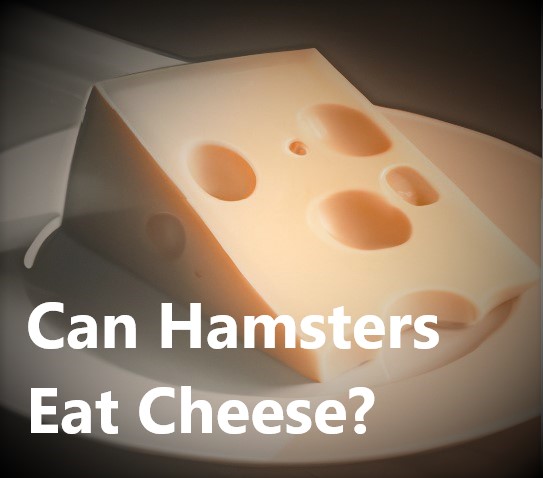As a hamster owner, you might be curious about whether it’s appropriate to offer a few of your treats to your tiny companion. One common question is, “Can hamsters eat cheese?”
In this complete guide, we will examine the kinds of cheese that are safe for hamsters, possible health issues related to feeding cheese to your pet, and guidelines for providing cheese as a treat. We will also suggest alternatives to cheese for hamsters with dietary restrictions.
Table of Contents
Can Hamsters Eat Cheese?
Hamsters can eat specific cheese types, but it is vital to select the appropriate kind. Low fat and low salt cheeses are the top choices for hamsters, such as low fat cottage cheese or mozzarella. Refrain from giving your hamster fatty or salty cheeses, processed cheese products, and moldy cheeses like Stilton or blue cheese.
While cheese is not poisonous for hamsters, it may not be part of a healthy diet for them. In fact, certain cheese types can cause digestive issues, diabetes, and obesity in hamsters.
Types of Cheese Hamsters Can Eat
When choosing cheese for your hamster, consider these options:
- Low-fat cottage cheese
- Mozzarella
Types of Cheese to Avoid
To prevent health problems, avoid feeding your hamster these types of cheese:
- Fatty or salty cheeses
- Aged cheddar
- Parmesan
- Processed cheese products
- Moldy cheeses
- Stilton
- Blue cheese
Cheese Safety and Health Issues
Although cheese is not poisonous for hamsters, specific varieties can present health risks. It is crucial to be aware of these concerns to ensure your hamster’s well being.
Toxicity
No matter the cheese type, there should be nothing in it that makes it toxic for your pet. However, moldy cheeses like Stilton or blue cheese may be harmful due to the bacteria they contain.
Health Effects
Giving your hamster certain cheese types can result in:
- Digestive problems
- Diabetes
- Obesity
To avoid these issues, it’s important to choose low-fat and low-salt cheese options and to reserve cheese as an occasional treat.
Cheese Feeding Guidelines
When it comes to offering cheese to your hamster, moderation is key. Here are some guidelines to follow:
- Cheese as a treat: Cheese is best reserved as a special treat for your furry friend.
- Amount of cheese to feed: It’s essential not to overfeed cheese to your pet. Offer small amounts, and monitor your hamster’s reaction.
- Avoid cheese from a can or spray cheese: Never feed your hamster cheese from a can or spray cheese, as these products may contain harmful additives.
Alternatives to Cheese
If your hamster is lactose intolerant or you’re seeking healthier treat options, consider providing fresh fruits and vegetables instead of cheese. These nutritious alternatives are generally well tolerated by hamsters and can offer a variety of essential vitamins and minerals.
Fresh Fruits
Some suitable fruits for hamsters include:
- Apples (without seeds)
- Bananas
- Blueberries
- Raspberries
- Strawberries
Remember to offer fruits in moderation, as their high sugar content can be detrimental to your hamster’s health if consumed excessively.
Vegetables
Hamsters can also enjoy various vegetables, such as:
- Broccoli
- Arugula
- Carrots
- Cauliflower
- Cucumber
- Kale
- Peas
- Spinach
Always introduce new fruits and vegetables gradually to avoid digestive issues, and thoroughly wash all produce before feeding it to your pet.
Lactose Intolerance Considerations
Have you ever wondered if your adorable little hamster can have dairy products like cheese? Did you know that certain hamsters might have trouble digesting lactose? This is due to lactose, a sugar commonly found in dairy products, can be challenging for their digestive systems to break down.
This condition is known as lactose intolerance, and it can cause digestive issues for these furry creatures. This can lead to digestive problems like diarrhea and gas. So, if you’re considering giving your hamster cheese, you may want to reconsider and opt for lactose-free treats like fresh fruits and veggies instead.
Keep your hamster happy and healthy by being mindful of their dietary needs!
Key Takeaways
- Hamsters can eat certain types of cheese, but it’s essential to choose low-fat and low-salt options like low-fat cottage cheese or mozzarella.
- Avoid feeding your hamster fatty or salty cheeses, processed cheese products, and moldy cheeses like Stilton or blue cheese.
- Cheese is not toxic for hamsters, but certain types can cause digestive problems, diabetes, and obesity.
- Reserve cheese as a special treat, and avoid feeding cheese from a can or spray cheese.
- For lactose-intolerant hamsters or those seeking healthier alternatives, consider offering fresh fruits and vegetables instead of cheese.
By understanding the types of cheese that are safe for hamsters and being aware of the potential health concerns associated with feeding cheese, you can ensure your furry friend enjoys a healthy, balanced diet.
Remember to offer cheese in moderation, and explore other nutritious treat options like fresh fruits and vegetables to keep your hamster happy and thriving.
Frequently Asked Questions
Q: Can hamsters eat cheese balls?
A: it is not recommended to feed hamsters cheese balls as they are high in salt, fat, and preservatives. These can cause digestive problems and health issues for your pet. It is better to offer them fresh vegetables, fruits, and commercially available hamster food as a daily diet.
